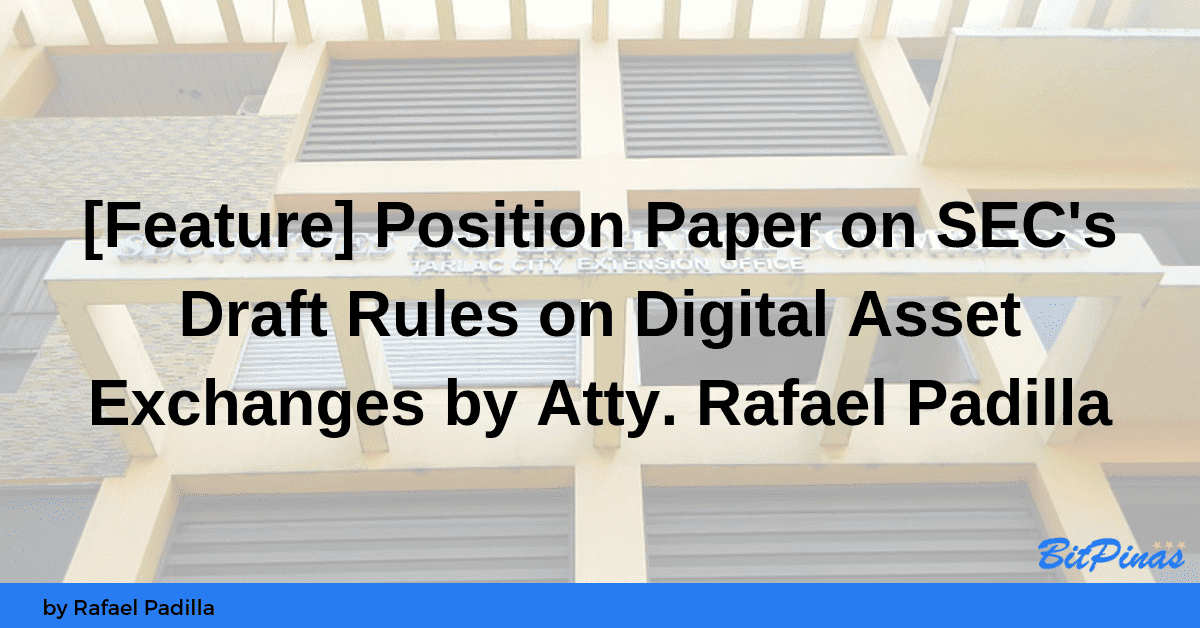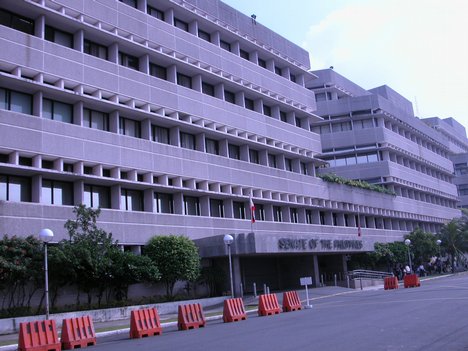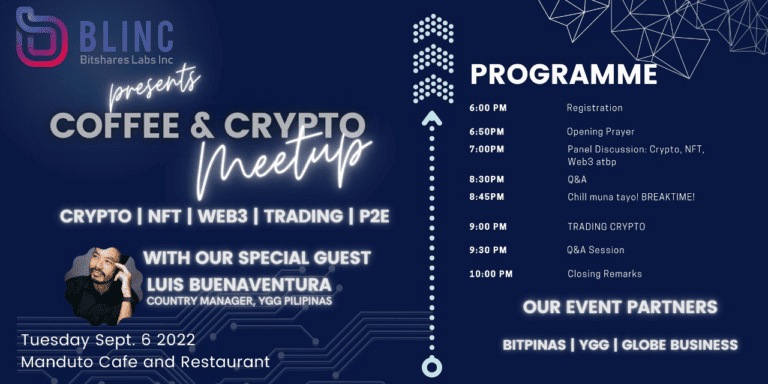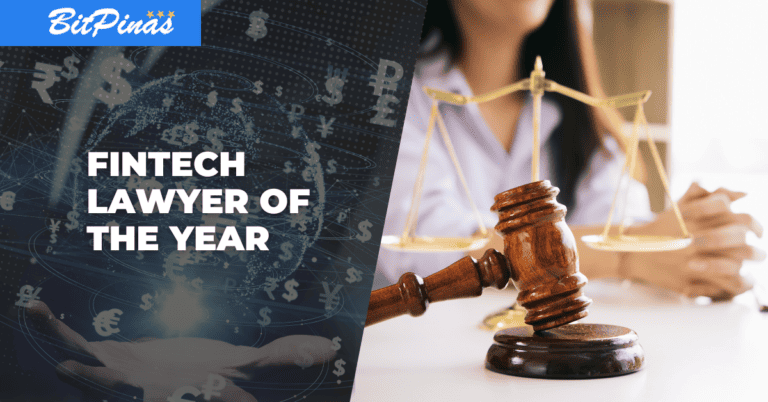Position Paper on SEC’s Draft Rules on Digital Asset Exchanges by Atty. Rafael Padilla
The Commission encourages the public to submit comments and position papers regarding the draft rules so that it can be improved to better serve the public and every party involved.

The Philippines’ Securities and Exchange Commission has released draft rules on Digital Asset Exchanges, set to become the guidelines for any person or company operating cryptocurrency exchanges in the country. The Commission encourages the public to submit comments and position papers regarding the draft rules so that it can be improved to better serve the public and every party involved.
Below is a portion of the position paper submitted by Atty. Rafael Padilla, founder of Blockchain Association of the Philippines and BlockDevs Asia. The entire paper can be viewed via a link at the end of the article. Anyone interested to have their positions and comments regarding the draft rules known to the public can send it to BitPinas. The views and opinions expressed in this article are that of the contributor and do not necessarily reflect that of this website.
Dear MSRD,
Thank you for your general invitation to submit our positions and proposals/recommendations in relation to the Securities and Exchange Commission’s proposed rules and regulations governing Digital Asset Exchanges (DAX). We appreciate the opportunity that this consultation has given to enable the public to comment on what we believe is one of the most important initiatives in capital markets in recent years.
The undersigned is a commercial attorney who focuses on financial technology, cryptoassets and blockchain. He works with some of the blockchain projects and financial technology startups operating in the Philippines and Asia Pacific, serving their legal and compliance requirements. He has worked with Rebittance Inc. and BloomSolutions Inc., one of the two Virtual Currency Exchanges (VCE) registered with the Bangko Sentral ng Pilipinas.
The undersigned co-founded the Blockchain Association of the Philippines, a nonprofit group that represents the interests of the local blockchain industry, and the Fintech Philippines Association. Most recently, he co-founded Block Devs Asia, an industry association for blockchain developers and technologists. He is also a professor of law at San Beda Alabang School of Law where he teaches Legal Interpretation, Constitutional Law, Tax and Transport Law.
We reviewed the original draft uploaded on the following link: http://www.sec.gov.ph/wp-content/uploads/2019/07/2019Notice_RulesinDigitalAsset.pdf We commend the Securities and Exchange Commission (SEC) in particular the MSRD for proposing a responsive regime that will now enable digital asset trading platforms to lawfully operate in the Philippine market. The SEC takes a progressive stance in developing a regulatory path for digital asset exchanges to be legally registered in accordance with established Philippine securities law. We observed SEC’s painstaking effort to recast traditional exchange registration rules and principles to particularly address the peculiarities and practices of digital asset trading platforms. We support most of the policies and rules proposed by the SEC. Yet in our view, the draft will need to clarify some of its policy considerations. Hence, the specific comments and proposed changes discussed below.
On the Definition of Digital Asset Exchange (DAX)
The definition appears to be incomplete. By referring to DAX as organized marketplace or facility where securities are traded, it is not clear whether the SEC takes the position that: (a) all digital assets traded on exchange are securities; or (b) the regulation applies only to digital asset trading platforms that support the listing and trading of security tokens, which could consequently mean that trading platforms that do not list security tokens will not be required to register with the SEC.
While we bear in mind that an “Exchange” is broadly defined under the Securities Regulation Code of 2000 (R.A. 8799) as a marketplace or facility that executes trades of both securities and commodities, we humbly take the view that the term “commodities” specifically relates to commodity futures and other commodity based derivatives, which under Section 11 falls within the regulatory ambit of the SEC. It does not seem to be the intent of the Securities Regulation Code to grant the SEC full authority on spot contracts in commodities market. Therefore, it is not yet clear whether the SEC has jurisdiction to regulate the trading of commodity tokens such as bitcoin (BTC) or ether (ETH) on the spot market, even when the transaction is executed by an
exchange or facility.
Considering that the SEC only seeks to regulate trading platforms according to the proposed rules, it is not necessary at all to enumerate other kinds of business activities in relation to “exchanges” because this will only cause confusion. Some digital asset service providers may not meet the definition of an “exchange” under the securities laws, even though they might directly or indirectly offer trading or other services relating to security tokens. For example, some platforms offer digital wallet services (to hold or store digital assets) or transact in digital assets that may be security tokens. In addition, a platform that facilitates the primary issuance of digital assets, such as so called “ICO Platforms”, may be participating in the primary offer or sale of securities. These and other services offered by platforms may trigger other registration requirements, including broker-dealer, transfer agent, or clearing agency registration, to name a few. But at the end of the day, these services and market professionals are subject to special rules imposed by the SRC and its IRR, where they are regulated and classified differently from securities exchanges.
Finally, we don’t think the following phrase will help define the concept of a digital asset exchange: “They can be viewed as an online marketplace for the entire Digital Asset network.” We therefore recommend the deletion of this sentence, if only to distill and simplify this important definition.
In summary, we wish to recommend that the definition of a digital asset exchange be amended as follows: “Digital Asset Exchange is an electronic marketplace or facility that brings together buyers and sellers and executes trades of digital assets, whether security tokens, commodity tokens or otherwise. This includes buying/selling digital assets with legal tender or other government issued currency (currency/digital asset pairing) as well as buying/selling digital assets with other digital asset (digital asset/digital asset pairing).”
Convertible digital asset being referred to as virtual asset with equivalent value in real currency
The term “real currency” seems to imply that digital assets that function as payment tokens such as bitcoin or Stellar lumens (XLM), i.e., cryptocurrencies, are fake or illusory. The fact that cryptocurrencies are now widely considered as a new asset class indicate that they have actual value in the market, and the fact that they are widely circulated demonstrate how they presently function as a currency. We therefore suggest to replace the term “real currency” with the phrase “legal tender or other government-issued currency”.
On fiat currency as the coin and paper money of a country that is designated
as its legal tender
Despite the increasing acceptance of the term “fiat currency” (even by regulators) which refers to government-issued currency, we think that it is politically incorrect to use this term. The word “fiat” means order or decree; describing currency as fiat seems to suggest that the legal tender has value only because the government decreed so. The term “fiat currency” is in some respects a disparaging remark that criticizes the government’s authority to issue currency and set monetary policy via central planning. We therefore suggest using the phrase “legal tender or government-issued currency” as an alternative.
On Initial Capitalization Requirements, requiring the exchange to maintain in fiat form an initial paid up capital of Php 100,000,000 as a minimum as well as holding regulatory equivalent to twelve months of operation expenses
We further suggest that instead of requiring the DAX to hold capital equivalent to 12 months operational expenses, SEC should be given discretion to determine such additional capital as will be sufficient to ensure the financial integrity of the DAX and its ongoing operations based on an assessment of the specific risks applicable to the DAX. This is the policy approach adopted by the New York DFS. Under Section 200.8, the following variety of factors can be considered in determining the appropriate capital requirement applicable to the applicant:
- composition of total assets, including the position, size, liquidity, risk exposure, and price volatility of each type of asset;
- composition of the total liabilities, including the size and repayment timing of each type of liability;
- actual and expected volume of transactions or activity;
- whether the applicant is already licensed or regulated under relevant financial services regulation, and in good standing in such capacity;
- amount of leverage employed;
- liquidity position of the applicant;
- financial protection that the applicant provides for its customers through its trust account or bond;
- types of entities to be serviced by the applicant; and
- types of products or services to be offered by the applicant.





